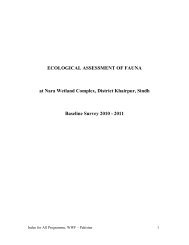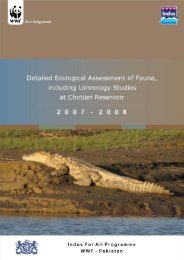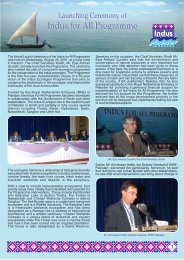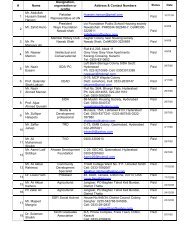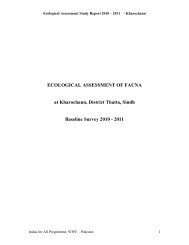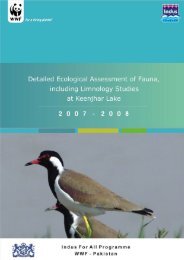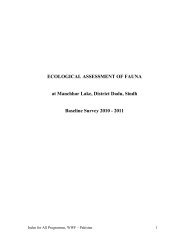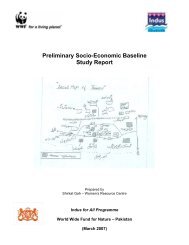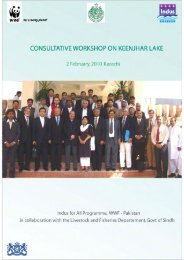Disclaimer note - WWF - Pakistan
Disclaimer note - WWF - Pakistan
Disclaimer note - WWF - Pakistan
Create successful ePaper yourself
Turn your PDF publications into a flip-book with our unique Google optimized e-Paper software.
Detailed Ecological Assessment Report 2008 – Keenjhar Lake<br />
3.5.8 Notes on the marine fishing policy<br />
3.5.8.1 Deep sea Trawlers<br />
In 1995 Govt. of <strong>Pakistan</strong> announced a deep sea fishing policy. Under this policy<br />
licenses for deep sea fishing are issued to deep sea trawlers of the international<br />
companies.<br />
• The deep sea trawlers in the process of fishing catch a large number<br />
of unwanted fish and then throw it in the sea. This practice pollutes<br />
the sea water and the live fish leaves that area.<br />
• These trawlers mostly use indiscriminate gear to have a maximum<br />
catch but only keeps that fish which generates lot of money. The<br />
official figure confirms that these trawlers discarded 332,000 m tons<br />
of fish during few years which resulted in a loss of 8 billion US$ to<br />
the country on one hand while on the other hand greatly polluted the<br />
water in the coastal areas.<br />
• These trawlers are supposed to fish in EEZ some 32 km from the<br />
shore. They often violate the boundaries and practice fishing inside<br />
35 km area and even close to creeks. Consequently, they not only<br />
deprive the fishermen from their livelihood but also damage their<br />
boats and nets.<br />
• Being fully computerized and mechanized, these trawlers continue<br />
fishing un-abated and catch millions of tons of fish day and night.<br />
This over-fishing practice results in depletion of stocks of various fish<br />
species.<br />
3.5.8.2 Exploitation of fishermen<br />
There are many forms of exploitation of the fishermen. One way of wielding<br />
influence on the local fishermen is to trap them by providing them loans. Due to<br />
non-availability of formal credit systems, the fisherfolk communities rely only on<br />
non-institutional/informal credit system. The existing informal system of providing<br />
loans to fishermen is extremely exploitative. Details of these middlemen and the<br />
way they exploit the fisherfolk is as below.<br />
3.5.8.3 Fishing boat owners<br />
Boat owners own boats (usually trawlers) and operate them as a business, just<br />
as any other business. Trawlers usually target prawns, which is the main fisheries<br />
export commodity. The owners usually have other significant business interests<br />
outside the fishing industry. The skippers and crew of the vessels are hired<br />
persons.<br />
3.5.8.4 Moles (Moleholders).<br />
These are businessmen who lend money to private vessel owners and reclaim<br />
the debt from the proceeds of the sale of the catch. A fisherman wishing to go out<br />
to sea will seek an advance from a moleholder, who will provide what is required<br />
(but not in cash, the fisherman will usually receive a written chit to the fisherman<br />
who has to get his supplies from a supplier in league with or even owned by the<br />
moleholder). On return from fishing the catch is auctioned by the moles in Fish<br />
Market and from the proceeds is deducted commission 6.25% of the value which<br />
is split up 50/50 between the Fishermen Cooperative Society (FCS) and the<br />
Moles who get 50% auctioneers commission. From the proceeds of the auction<br />
after deduction of the 6.25% commission the moles deduct their pre trip<br />
<strong>WWF</strong> <strong>Pakistan</strong> – Indus for All Programme Page 81 of 188



